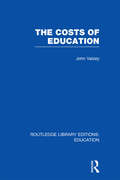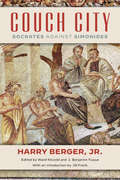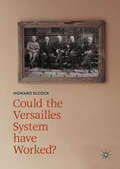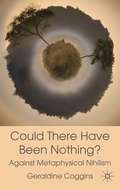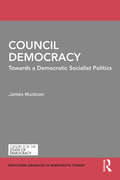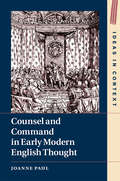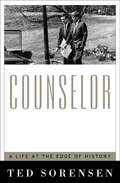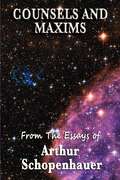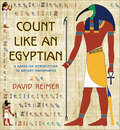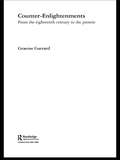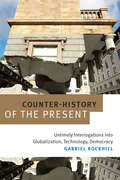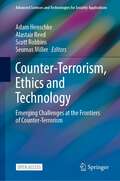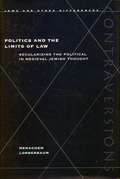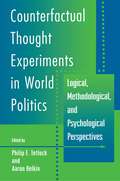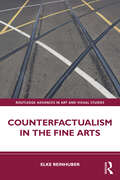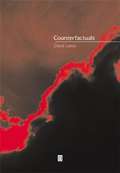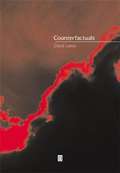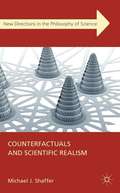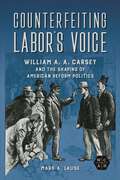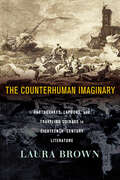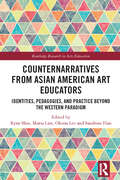- Table View
- List View
The Costs and Benefits of Animal Experiments
by Andrew KnightA comprehensive review of recent scientific evidence examining the contributions of animal experimentation to human healthcare. The book also explores toxicity prediction, animal use during life and health sciences education, impacts on student attitudes toward animals, and the extent to which animals suffer in laboratories.
The Costs of Education (Routledge Library Editions: Education)
by John VaizeyThis is the first book which authoritatively reviews the UK expenditure on education from 1920 – 1955, both by local authorities and private schools. The book takes the main elements of education in turn and discusses them in detail. There are original studies of local authority finance, of teachers’ pay and of the economics of private education. It examines educational spending by social class and compares the growth of educational services in England and Wales, Scotland and Northern Ireland.
Couch City: Socrates against Simonides
by Harry BergerCrowning six decades of literary, rhetorical, and historical scholarship, Harry Berger, Jr., offers readers another trenchant reading. Berger subverts the usual interpretations of Plato’s kalos kagathos, showing Socrates to be trapped in a double ventriloquism, tethered to his interlocutors’ speech acts even as they are tethered to his. Plato’s Republic and Protagoras both reserve a small but significant place for a poet who differs from Homer and Hesiod: the lyric poet Simonides of Ceos. In the Protagoras, Socrates takes apart a poem attributed to Simonides and uses this to finish off the famous and supposedly dangerous sophist, Protagoras. Couch City is a close reading of the comic procedures Socrates deploys against Protagoras as he reduces him to silence. But it also shows that Socrates takes the danger posed by Protagoras and his fellow sophists seriously. Even if they are represented as buffoons, sophists are among the charismatic authority figures—poets, rhapsodes, seers, orators, and lawgivers—who promote views harmful to Athenian democracy. Socrates uses Simonides’s poem to show how sophists not only practice misinterpretation but are unable to defend against it. Berger ports his roots as a pioneering literary theorist into this rhetorical discussion, balancing ideas such as speech-act theory with hard-nosed philology. The result is a provocative and counterintuitive reassessment of Plato’s engagement with democracy.
Could the Versailles System have Worked?
by Howard ElcockThis book explores the significance of the post-First World War peace settlement negotiated at Versailles in 1919. Versailles has always been a controversial subject and it has long been contended that the Treaty imposed unnecessarily severe conditions upon the defeated nations, particularly Germany, and in large part can be held responsible for the outbreak of war in 1939. This book considers the critical question as to whether the Treaty of Versailles established a new international settlement that could produce a peaceful and prosperous Europe, something that many have alleged was impossible. In an exhaustive analysis of the events that followed the Paris Peace Conference, Howard Elcock argues that the Versailles Treaty created a more stable diplomatic framework than has commonly been recognised, and challenges the traditional understanding that the delegates at Versailles can be held responsible for the failure to secure long-term peace in Europe.
Could There Have Been Nothing?
by Geraldine CogginsThe first book-length study of metaphysical nihilism: an analytical treatment of one of the most intriguing and fundamental questions in contemporary analytic metaphysics: Could there have been nothing at all? No physical universe, no people, no living beings, no planets, no atoms, no matter, no energy - nothing?
Council Democracy: Towards a Democratic Socialist Politics (Routledge Advances in Democratic Theory)
by James MuldoonThe return to public assemblies and direct democratic methods in the wave of the global "squares movements" since 2011 has rejuvenated interest in forms of council organisation and action. The European council movements, which developed in the immediate post-First World War era, were the most impressive of a number of attempts to develop workers’ councils throughout the twentieth century. However, in spite of the recent challenges to liberal democracy, the question of council democracy has so far been neglected within democratic theory. This book seeks to interrogate contemporary democratic institutions from the perspective of the resources that can be drawn from a revival and re-evaluation of the forgotten ideal of council democracy. This collection brings together democratic theorists, socialists and labour historians on the question of the relevance of council democracy for contemporary democratic practices. Historical reflection on the councils opens our political imagination to an expanded scope of the possibilities for political transformation by drawing from debates and events at an important historical juncture before the dominance of current forms of liberal democracy. It offers a critical perspective on the limits of current democratic regimes for enabling widespread political participation and holding elites accountable. This timely read provides students and scholars with innovative analyses of the councils on the 100th anniversary of their development. It offers new analytic frameworks for conceptualising the relationship between politics and the economy and contributes to emerging debates within political theory on workplace, economic and council democracy.
Counsel and Command in Early Modern English Thought (Ideas in Context #125)
by Joanne PaulWhile it has often been recognised that counsel formed an essential part of the political discourse in early modern England, the precise role that it occupied in the development of political thinking has remained obscure. This comprehensive and rigorous study of early modern English political counsel establishes the importance of the relationship between political counsel and the discourse of sovereignty. Tracing the changes and evolution of writings on political counsel during the 'monarchy of counsel', from the end of the Wars of the Roses to the end of the English Civil War, Joanne Paul examines English thought in its domestic and transnational context, providing an original account of the relationship between counsel and emerging conceptions of sovereignty. Formed at the conjunction of the history of political thought and English political history, this book grounds textual analysis within the context of court politics, intellectual and patronage networks, and diplomacy.
Counselor: A Life at the Edge of History
by Theodore C. SorensonIn his memoir Counselor, Theodore C. Sorensen recounts advising John F. Kennedy through the most dramatic moments in American history.JFK’s closest guide, Sorensen begins his story in January 1953, when he and the freshman senator from Massachusetts began their extraordinary professional and personal relationship. Rising from legislative assistant to speechwriter and advisor, the young lawyer from Nebraska worked closely with JFK on his most important speeches, as well as his book Profiles in Courage. Sorensen encouraged the junior senator's political ambitions—from a failed bid for the vice presidential nomination in 1956 to the successful presidential campaign in 1960, after which he was named Special Counsel to the President.Sorensen describes in thrilling detail his experience advising JFK during some of the most crucial days of his presidency, from the decision to go to the moon to the Cuban Missile Crisis, when JFK requested that the thirty-four-year-old Sorensen draft the key letter to Khrushchev at the most critical point of the world's first nuclear confrontation. After Kennedy was assassinated, Sorensen stayed with President Johnson for a few months before leaving to write a biography of JFK. In 1968 he returned to Washington to help run Robert Kennedy's presidential campaign. Through it all, Sorensen never lost sight of the ideals that brought him to Washington and to the White House, working tirelessly to promote and defend free, peaceful societies.“This book is instantly essential for any student of the period. It fills gaps in the historical record; it vividly conveys life inside the administration; and it generously dishes anecdotes.” —Washington Post
Counsels and Maxims
by Arthur SchopenhauerSo if you have to live amongst men, you must allow everyone the right to exist in accordance with the character he has, whatever it turns out to be: and all you should strive to do is to make use of this character in such a way as its kind and nature permit, rather than to hope for any alteration in it, or to condemn it off-hand for what it is. This is the true sense of the maxim--Live and let live. That, however, is a task which is difficult in proportion as it is right; and he is a happy man who can once for all avoid having to do with a great many of his fellow creatures.
Count Like an Egyptian: A Hands-on Introduction to Ancient Mathematics
by David ReimerA lively collection of fun and challenging problems in ancient Egyptian mathThe mathematics of ancient Egypt was fundamentally different from our math today. Contrary to what people might think, it wasn't a primitive forerunner of modern mathematics. In fact, it can’t be understood using our current computational methods. Count Like an Egyptian provides a fun, hands-on introduction to the intuitive and often-surprising art of ancient Egyptian math. David Reimer guides you step-by-step through addition, subtraction, multiplication, and more. He even shows you how fractions and decimals may have been calculated—they technically didn’t exist in the land of the pharaohs. You’ll be counting like an Egyptian in no time, and along the way you’ll learn firsthand how mathematics is an expression of the culture that uses it, and why there’s more to math than rote memorization and bewildering abstraction.Reimer takes you on a lively and entertaining tour of the ancient Egyptian world, providing rich historical details and amusing anecdotes as he presents a host of mathematical problems drawn from different eras of the Egyptian past. Each of these problems is like a tantalizing puzzle, often with a beautiful and elegant solution. As you solve them, you’ll be immersed in many facets of Egyptian life, from hieroglyphs and pyramid building to agriculture, religion, and even bread baking and beer brewing.Fully illustrated in color throughout, Count Like an Egyptian also teaches you some Babylonian computation—the precursor to our modern system—and compares ancient Egyptian mathematics to today’s math, letting you decide for yourself which is better.
Counter-Enlightenments: From the Eighteenth Century to the Present (Routledge Studies in Social and Political Thought)
by Graeme GarrardThe Enlightenment and its legacy are still actively debated, with the Enlightenment acting as a key organizing concept in philosophy, social theory and the history of ideas. Counter-Enlightenments is the first full-length study to deal with the history and development of counter-enlightenment thought from its inception in the eighteenth century right through to the present. Engaging in a critical dialogue with Isaiah Berlin’s work, this book analyzes the concept of counter-enlightenment and some of the most important issues and problems it raises. Graeme Garrard explores the diverse forms of thought in this field, with a wide-ranging review of the principle figures of the past two hundred and fifty years, and an incisive assessment of the persuasiveness of the most common and important criticisms of the Enlightenment.
Counter-History of the Present: Untimely Interrogations into Globalization, Technology, Democracy
by Gabriel RockhillIn Counter-History of the Present Gabriel Rockhill contests, dismantles, and displaces one of the most widespread understandings of the contemporary world: that we are all living in a democratized and globalized era intimately connected by a single, overarching economic and technological network. Noting how such a narrative fails to account for the experiences of the billions of people who lack economic security, digital access, and real political power, Rockhill interrogates the ways in which this grand narrative has emerged in the same historical, economic, and cultural context as the fervid expansion of neoliberalism. He also critiques the concurrent valorization of democracy, which is often used to justify U.S. military interventions on the behalf of capital. Developing an alternative account of the current conjuncture that acknowledges the plurality of lived experiences around the globe and in different social strata, he shifts the foundations upon which debates about the contemporary world can be staged. Rockhill's counter-history thereby offers a new grammar for historical narratives, creating space for the articulation of futures no longer engulfed in the perpetuation of the present.
Counter-Terrorism, Ethics and Technology: Emerging Challenges at the Frontiers of Counter-Terrorism (Advanced Sciences and Technologies for Security Applications)
by Adam Henschke Alastair Reed Scott Robbins Seumas MillerThis open access book brings together a range of contributions that seek to explore the ethical issues arising from the overlap between counter-terrorism, ethics, and technologies. Terrorism and our responses pose some of the most significant ethical challenges to states and people. At the same time, we are becoming increasingly aware of the ethical implications of new and emerging technologies. Whether it is the use of remote weapons like drones as part of counter-terrorism strategies, the application of surveillance technologies to monitor and respond to terrorist activities, or counterintelligence agencies use of machine learning to detect suspicious behavior and hacking computers to gain access to encrypted data, technologies play a significant role in modern counter-terrorism. However, each of these technologies carries with them a range of ethical issues and challenges. How we use these technologies and the policies that govern them have broader impact beyond just the identification and response to terrorist activities. As we are seeing with China, the need to respond to domestic terrorism is one of the justifications for their rollout of the “social credit system.” Counter-terrorism technologies can easily succumb to mission creep, where a technology’s exceptional application becomes normalized and rolled out to society more generally. This collection is not just timely but an important contribution to understand the ethics of counter-terrorism and technology and has far wider implications for societies and nations around the world.
Counterculture Colophon: Grove Press, the Evergreen Review, and the Incorporation of the Avant-Garde
by Loren GlassResponsible for such landmark publications asLady Chatterley's Lover,Tropic of Cancer,Naked Lunch, Waiting for Godot,The Wretched of the Earth, andThe Autobiography of Malcolm X, Grove Press was the most innovative publisher of the postwar era. Counterculture Colophontells the story of how the press and its house journal,The Evergreen Review, revolutionized the publishing industry and radicalized the reading habits of the "paperback generation. " In the process, it offers a new window onto the 1960s, from 1951, when Barney Rosset purchased the fledgling press for $3,000, to 1970, when the multimedia corporation into which he had built the company was crippled by a strike and feminist takeover. Grove Press was not only responsible for ending censorship of the printed word in the United States but also for bringing avant-garde literature, especially drama, into the cultural mainstream as part of the quality paperback revolution. Much of this happened thanks to Rosset, whose charismatic leadership was crucial to Grove's success. With chapters covering world literature and the Latin American boom, including Grove's close association with UNESCO and the rise of cultural diplomacy; experimental drama such as the theater of the absurd, the Living Theater, and the political epics of Bertolt Brecht; pornography and obscenity, including the landmark publication of the complete work of the Marquis de Sade; revolutionary writing, featuring Rosset's daring pursuit of the Bolivian journals of Che Guevara; and underground film, including the innovative development of the pocket filmscript, Loren Glass covers the full spectrum of Grove's remarkable achievement as a communications center of the counterculture.
Counterfactual Thought Experiments in World Politics: Logical, Methodological, and Psychological Perspectives
by Philip E. Tetlock Aaron BelkinPolitical scientists often ask themselves what might have been if history had unfolded differently: if Stalin had been ousted as General Party Secretary or if the United States had not dropped the bomb on Japan. Although scholars sometimes scoff at applying hypothetical reasoning to world politics, the contributors to this volume--including James Fearon, Richard Lebow, Margaret Levi, Bruce Russett, and Barry Weingast--find such counterfactual conjectures not only useful, but necessary for drawing causal inferences from historical data. Given the importance of counterfactuals, it is perhaps surprising that we lack standards for evaluating them. To fill this gap, Philip Tetlock and Aaron Belkin propose a set of criteria for distinguishing plausible from implausible counterfactual conjectures across a wide range of applications. The contributors to this volume make use of these and other criteria to evaluate counterfactuals that emerge in diverse methodological contexts including comparative case studies, game theory, and statistical analysis. Taken together, these essays go a long way toward establishing a more nuanced and rigorous framework for assessing counterfactual arguments about world politics in particular and about the social sciences more broadly.
Counterfactualism in the Fine Arts (Routledge Advances in Art and Visual Studies)
by Elke ReinhuberCounterfactual thinking has become an established method to evaluate decisions in a range of disciplines, including history, psychology and literature. Elke Reinhuber argues it also has valuable applications in the fine arts and popular media. A fascination with the path not taken is a logical consequence of a world saturated with choices. Art which provokes and explores these tendencies can help to recognise and contextualise the impulse to avoid or endlessly revisit individual or collective decisions. Reinhuber describes the term in broad strokes through the disciplines to show how counterfactualism finds shape in contemporary art forms, especially in photography, film, and immersive and interactive media art (such as 360° content, virtual reality and augmented reality). She analyses the different stages of counterfactuals with examples where artists experience counterfactual thoughts in the process of art production, explore these thoughts in their artwork, and where the artwork itself evokes counterfactual thoughts in the audience. A fascinating exploration for scholars and students of art, media and the humanities, and anybody else with an interest in choices, the art of decisionmaking and counterfactualism.
Counterfactuals
by David LewisCounterfactuals is David Lewis's forceful presentation of and sustained argument for a particular view about propositions which express contrary-to-fact conditionals, including his famous defense of realism about possible worlds. Since its original publication in 1973, it has become a classic of contemporary philosophy, and is essential reading for anyone interested in the logic and metaphysics of counterfactuals. The book also includes an appendix of related writings by Lewis.
Counterfactuals
by David LewisCounterfactuals is David Lewis' forceful presentation of and sustained argument for a particular view about propositions which express contrary to fact conditionals, including his famous defense of realism about possible worlds.
Counterfactuals and Causal Inference
by Stephen L. Morgan Christopher WinshipDid mandatory busing programs in the 1970s increase the school achievement of disadvantaged minority youth? Does obtaining a college degree increase an individual's labor market earnings? Did the use of the butterfly ballot in some Florida counties in the 2000 presidential election cost Al Gore votes? If so, was the number of miscast votes sufficiently large to have altered the election outcome? At their core, these types of questions are simple cause-and-effect questions. Simple cause-and-effect questions are the motivation for much empirical work in the social sciences. This book presents a model and set of methods for causal effect estimation that social scientists can use to address causal questions such as these. The essential features of the counterfactual model of causality for observational data analysis are presented with examples from sociology, political science, and economics.
Counterfactuals and Causal Inference
by Stephen L. Morgan - Christopher WinshipDid mandatory busing programs in the 1970s increase the school achievement of disadvantaged minority youth? Does obtaining a college degree increase an individual's labor market earnings? Did the use of the butterfly ballot in some Florida counties in the 2000 presidential election cost Al Gore votes? If so, was the number of miscast votes sufficiently large to have altered the election outcome? At their core, these types of questions are simple cause-and-effect questions. Simple cause-and-effect questions are the motivation for much empirical work in the social sciences. This book presents a model and set of methods for causal effect estimation that social scientists can use to address causal questions such as these. The essential features of the counterfactual model of causality for observational data analysis are presented with examples from sociology, political science, and economics.
Counterfactuals and Scientific Realism
by Michael J. ShafferScientific realism is the view that the sciences aim to discover scientific theories that are true, or at least approximately true. Scientific realism is widely accepted by both scientists and philosophers of science. However, in practice - and perhaps even in principle - scientists are forced to simplify theories by idealizing. Some more skeptical philosophers of science have questioned the acceptability of scientific realism because they claim that theories involving idealizations are not even approximately true. This book is an attempt to show that scientific realism is compatible with the presence of idealization in the sciences. The main contention of this book is that idealized theories can be treated as counterfactuals about how things are in worlds that are similar to but simpler than the actual world. So understood it is clear that they have perfectly ordinary truth conditions. This implies that scientific theories that incorporate idealizations can be true despite the objections of anti-realists.
Counterfeiting Labor's Voice: William A. A. Carsey and the Shaping of American Reform Politics (Working Class in American History)
by Mark A. LauseConfidence man and canny operative, charlatan and manipulator--William A. A. Carsey emerged from the shadow of Tammany Hall to build a career undermining working-class political organizations on behalf of the Democratic Party. Mark A. Lause’s biography of Carsey takes readers inside the bare-knuckle era of Gilded Age politics. An astroturfing trailblazer and master of dirty tricks, Carsey fit perfectly into a Democratic Party that based much of its post-Civil War revival on shattering third parties and gathering up the pieces. Lause provides an in-depth look at Carsey’s tactics and successes against the backdrop of enormous changes in political life. As Carsey used a carefully crafted public persona to burrow into unsuspecting organizations, the forces he represented worked to create a political system that turned voters into disengaged civic consumers and cemented America’s ever-fractious two-party system.
The Counterhuman Imaginary: Earthquakes, Lapdogs, and Traveling Coinage in Eighteenth-Century Literature
by Laura BrownThe Counterhuman Imaginary proposes that alongside the historical, social, and institutional structures of human reality that seem to be the sole subject of the literary text, an other-than-human world is everywhere in evidence. Laura Brown finds that within eighteenth-century British literature, the human cultural imaginary can be seen, equally, as a counterhuman imaginary—an alternative realm whose scope and terms exceed human understanding or order.Through close readings of works by Daniel Defoe, Jonathan Swift, and Alexander Pope, along with lapdog lyrics, circulation narratives that give agency to inanimate objects like coins and carriages, and poetry about the Lisbon earthquake of 1755, Brown traces the ways presence and power of the nonhuman—weather, natural disasters, animals, even the concept of love—not only influence human creativity, subjectivity, and history but are inseparable from them. Traversing literary theory, animal studies, new materialism, ecocriticism, and affect theory, The Counterhuman Imaginary offers an original repudiation of the centrality of the human to advance an integrative new methodology for reading chaos, fluidity, force, and impossibility in literary culture.
Counternarratives from Asian American Art Educators: Identities, Pedagogies, and Practice beyond the Western Paradigm (Routledge Research in Arts Education)
by Ryan Shin Maria Lim Oksun Lee Sandrine HanCounternarratives from Asian American Art Educators: Identities, Pedagogies, and Practice beyond the Western Paradigm collects and explores the professional and pedagogical narratives of Asian art educators and researchers in North America. Few studies published since the substantial immigration of Asian art educators to the US in the 1990s have addressed their professional identities in higher education, K-12, and museum contexts. By foregrounding narratives from Asian American arts educators within these settings, this edited volume enacts a critical shift from Western, Eurocentric perspectives to the unique contributions of Asian American practitioners. Enhanced by the application of the AsianCrit framework and theories of intersectionality, positionality, decolonization, and allyship, these original contributor counternarratives focus on professional and pedagogical discourses and practices that support Asian American identity development and practice. A significant contribution to the field of art education, this book highlights the voices and experiences of Asian art educators and serves as an ideal scholarly resource for exploring their identity formation, construction, and development of a historically underrepresented, minoritized group in North America.
Counternarratives from Asian American Art Educators: Identities, Pedagogies, and Practice beyond the Western Paradigm (Routledge Research in Arts Education)
by Ryan Shin Maria Lim Oksun Lee Sandrine HanCounternarratives from Asian American Art Educators: Identities, Pedagogies, and Practice beyond the Western Paradigm collects and explores the professional and pedagogical narratives of Asian art educators and researchers in North America. Few studies published since the substantial immigration of Asian art educators to the United States in the 1990s have addressed their professional identities in higher education, K-12, and museum contexts. By foregrounding narratives from Asian American arts educators within these settings, this edited volume enacts a critical shift from Western, Eurocentric perspectives to the unique contributions of Asian American practitioners.Enhanced by the application of the AsianCrit framework and theories of intersectionality, positionality, decolonization, and allyship, these original contributor counternarratives focus on professional and pedagogical discourses and practices that support Asian American identity development and practice. A significant contribution to the field of art education, this book highlights the voices and experiences of Asian art educators and serves as an ideal scholarly resource for exploring their identity formation, construction, and development of a historically underrepresented minoritized group in North America.

